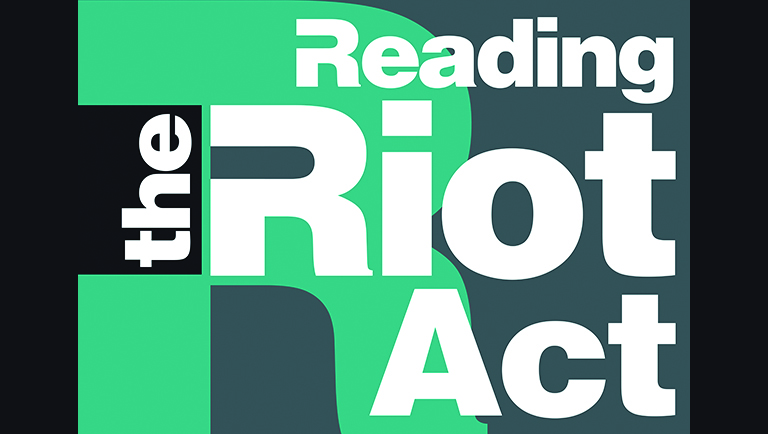- Présentation
- Rubriques
- Animation socioculturelle, de l’éducation populaire au marché
- Canal Géo
- Carnet de passages
- Cinélatino
- Colloques
- Films documentaires
- Grandes conférences
- Industrie en France (XVIIe-XXIe)
- Itinéraires universitaires
- Journées d'étude, débats
- Laboratoire TRACES
- Les mardis de la Socio
- Les mercredis de la Géographie
- Penser la santé
- Poéthiques
- Reading the Riot Act
- Recherche & Opéra
- Varia
- VO : Langues et cultures
- Partenaires
- Contact
Reading the Riot Act
Description
About the podcast
This series takes a look at British protests in the late 18th and early 19th century which have been dubbed ‘riots’. Each episode seeks to understand what sparked a particular outbreak of collective disturbance, who exactly was involved, how disorder was handled by those in authority, the way in which riots were talked about and reported on, and what changed in their wake. Artistic and literary responses to protest will also be explored. Thought will also be given to how riots have been remembered in official accounts and popular memory and the way in which historiographical approaches to outbreaks of protest have changed over time. These aspects will be tackled in discussion with historians and scholars of art, literature and culture who work in the field.
Nous nous pencherons dans cette série sur des mouvements de contestation en Grande Bretagne à la fin du XVIIIe et au début du XIXe siècle, mouvements qui ont été catégorisés, au moment des faits, comme des ‘émeutes’. Qu’est que ce qui a déclenché une période de désordre ? Qui étaient les acteurs et les actrices ? Comment est-ce que les autorités ont réagi face à la crise ? Quelles représentations trouve-t-on dans la presse et dans des témoignages de l’époque ? Chaque épisode explorera en profondeur ces questions tout en s’intéressant à l’impact à long-terme d’un épisode de conflit social. Les réponses artistiques et littéraires seront également prises en compte tout comme la manière dont des émeutes ont été évoquées dans les récits officiels, dans l’historiographie ainsi que dans la mémoire collective. Nous aborderons ces questions en compagnie d’historiens et d’autres spécialistes travaillant dans le domaine.
About the presenter
Rachel Rogers teaches in the English Studies department at the University of Toulouse-Jean Jaurès and her research focuses on turn-of-the-nineteenth-century radicalism and popular politics. She has worked on the role of the British community in early republican Paris after 1792, and her book on the topic, Friends of the Revolution, came out in 2021. At the moment she is working on women in popular radicalism and protest in the period 1780 to 1820.
Rachel Rogers enseigne dans le département d’études du monde anglophone à l’université de Toulouse-Jean Jaurès. Ses recherches portent sur les mouvements de contestation au tournant du XIXe siècle et sur la participation politique des gens ordinaires. Son livre sur la population britannique à Paris à l’époque de la Révolution française est paru en 2021. Elle travaille actuellement sur les femmes dans des mouvements populaires entre 1780 et 1820.
Entretiens
The Peterloo massacre, 1819 – Reading the Riot Act #4
Specialist of Lancashire radical culture in the early 19th century, Robert Poole provides context to and explanation of the events that took place in Manchester on 16th August 1819. Eighteen people
The Newport Rising, 1839 / Reading the Riot Act #3
I talk to Matthew Roberts, a historian of Chartism at Sheffield Hallam University, about the Chartist rising which took place in Newport, South Wales, in November 1839, just after Parliament had
The Luddite protests, 1811-12 / Reading the Riot Act #2
In this episode, the focus is on the ‘Luddite’ movement of 1811-12 when machine-breaking actions proliferated in the English cloth-making counties of Nottinghamshire, Lancashire, Cheshire and
The Gordon Riots, 1780 / Reading the Riot Act #1
This episode looks in depth at the Gordon riots which took place in London in June 1780. What has often been seen as an anti-Catholic protest, occurring when Britain was fighting to retain its prized
Intervenants
Professeur d'histoire, University of Central Lancashire (en 2024)
Angliciste. - Agrégée d'anglais (en 2008). - Titulaire d'un doctorat en anglais, Toulouse 2 (en 2012). - Enseignante-chercheuse à l'Université Toulouse-Jean Jaurès (depuis 2013). - Membre du laboratoire Cultures Anglo-Saxonnes (en 2022). - Membre du laboratoire Centre for Anglophone Studies (en 2024). - Maître de conférences en civilisation britannique à l'Université Toulouse-Jean Jaurès (en 2024)
Enseignant en histoire, Sheffield Hallam University, Grande-Bretagne (en 2009, en 2024)
Enseignante-chercheuse à l’université du Hertfordshire, Royaume-Uni (en 2024)
Diplômé de l'Université de Londres. Directeur du Centre for Research in Romanticism (en 2020). Professeur de littérature anglaise à Roehampton University, UK (en 2020, en 2024)

